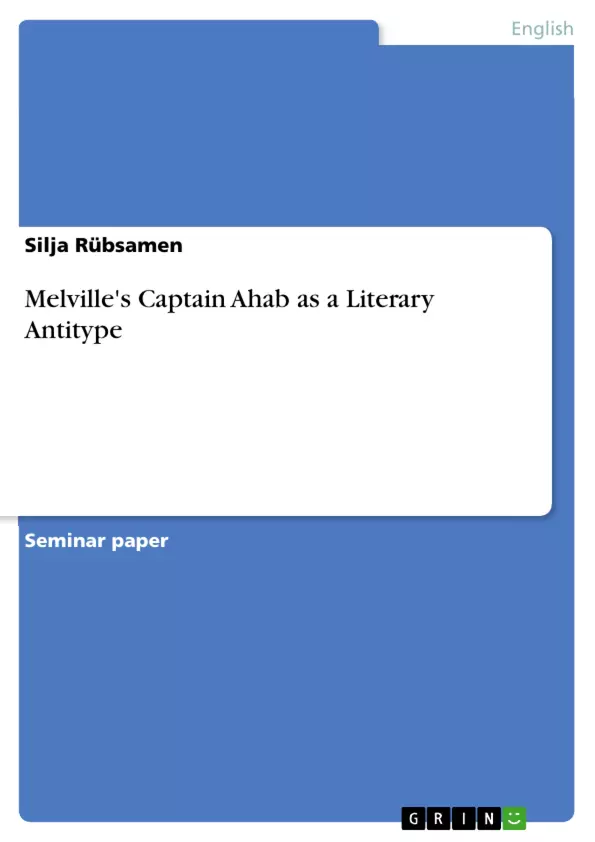1. Introduction: The Bible as a Source
Of all sources for Moby-Dick, the Bible, as an inescapable part of his education, was Melville′s best and earliest known one. Herman Melville was raised in a pious middle class perception of religion, and broadened his horizon of knowledge about Scripture and its reception throughout the centuries through the study of biblical commentaries, metaphysical essays, sermons, religious poetry, and of course of the "opposition": stoic, skeptical, and deist literature. No other major writer of Melville′s times makes such extensive use of Scripture. Not even Emerson, with an actual career as an Unitarian minister, or Hawthorne, who grew up in a Salem Calvinist family, make a comparable effort to use the Bible as a source, or to imply comparable grave consequences for the world view of both reader and author in their use of it.
Raised with the Bible, Melville′s biblical allusions appear with such regularity that their use seems "not studied but involuntarily." The spontaneity of their occurrence points to the fact that Melville had internalized the contents and styles of Scripture to an extent that made him employ biblical imagery, characters, and themes as if they had sprung from his own mind. There are about 250 obvious allusions to biblical passages in Moby-Dick , and an almost indefinite number of thematic and stylistic borrowings. Throughout Melville′s career as an author, the number of allusions to biblical writings continually rises, from only a dozen in his first novel, Typee, to more than 550 in Clarel, the latter being the only work with more references to Scripture than Moby-Dick.
In Nathalia Wright′s list of the biblical books which Herman Melville marked and commented upon, the books of Ecclesiastes and Job have most markings, right after the Psalms, Matthew, and Isaiah, which suggests "close connections […] between the Bibles he read and the books Melville wrote." Of the passages thoroughly marked the wisdom sentiments in Job, especially the dialogue between Yahweh and Job in Job, ch. 38ff, as well as the short book of Jonah, are most notable for their recurrence as important features of Melville′s novels.
[...]
Table of Contents
- Introduction
- Melville's Captain Ahab as a Literary Antitype
- The Concept of Ahab as an “Antitype”
- Captain Ahab as an Antitype
- Conclusion
Objectives and Key Themes
This essay explores the creation of Captain Ahab in Herman Melville's *Moby-Dick*, focusing on the use of biblical imagery and characters, particularly from 1 Kings, Jonah, and Job. The analysis examines how Melville reinterprets these biblical figures to create a complex antitypical character in Ahab, who surpasses his biblical counterparts in his personal quest for the unreachable.
- Melville's use of biblical imagery and characters in creating Captain Ahab.
- The concept of typology in biblical interpretation and its application to Ahab's character.
- The unique characteristics of Ahab as an antitypical character, surpassing his biblical counterparts.
- The influence of the Bible on Melville's worldview and his engagement with religious themes.
- Ahab's relationship to biblical characters like Jonah and Job and the potential interpretations of his actions.
Chapter Summaries
- Introduction: The Bible as a Source: This chapter introduces Melville's extensive use of biblical allusions in his writing, highlighting his deep familiarity with the Bible and its impact on his worldview. It discusses how Melville's internalized knowledge of Scripture is evident in his use of biblical imagery, characters, and themes in his novels. The chapter also mentions the prevalence of biblical allusions throughout Melville's career, particularly in *Moby-Dick* and *Clarel*.
- Melville's Captain Ahab as a Literary Antitype: This chapter explores the creation of Ahab, highlighting Melville's use of biblical characters like King Ahab, Jonah, and Job. The chapter discusses how Melville reinterprets these figures to create a complex antitypical character in Ahab, who surpasses his biblical counterparts in his personal quest for the unreachable. The chapter also examines the concept of typology in biblical interpretation, explaining how Melville employs this method in shaping Ahab's character.
Keywords
The key themes and concepts of this essay include: Melville, Moby-Dick, Captain Ahab, biblical allusions, typology, antitype, King Ahab, Jonah, Job, scriptural interpretation, religious themes, worldview, literary analysis, character creation.
Frequently Asked Questions
Why is the Bible considered a major source for Melville's Moby-Dick?
Melville was raised in a pious environment and internalized Scripture to such an extent that Moby-Dick contains about 250 obvious biblical allusions, influencing his style and worldview.
What does the term "Antitype" mean in the context of Captain Ahab?
An antitype is a literary or theological figure that corresponds to an earlier "type." Ahab is seen as an antitype who reinterprets and often surpasses his biblical namesakes in his tragic quest.
Which biblical books influenced the character of Ahab the most?
The main influences come from the First Book of Kings (King Ahab), the Book of Jonah, and the Book of Job, particularly regarding themes of defiance and suffering.
How does Melville's use of the Bible compare to his contemporaries?
Unlike Emerson or Hawthorne, Melville made a more extensive and involuntary effort to use the Bible, implying grave consequences for the worldviews of both the reader and the author.
What is the significance of the dialogue between Yahweh and Job for Moby-Dick?
Melville thoroughly marked passages in Job ch. 38ff. These themes of man's confrontation with the unreachable and the divine are central to Ahab's character and his struggle with the white whale.
- Quote paper
- Silja Rübsamen (Author), 2002, Melville's Captain Ahab as a Literary Antitype, Munich, GRIN Verlag, https://www.grin.com/document/7566



